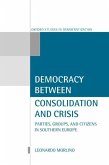Whether called pressure groups, NGOs, social movement organisations or organized civil society, the value of groups to the policy process, to economic growth, to governance, to political representation and to democracy has always been contested. However, there seems to be a contemporary resurgence in this debate largely centred on their democratising potential: can groups effectively link citizens to political institutions and policy processes? Are groups an antidote to emerging democratic deficits? Or do groups themselves face challenges in demonstrating their legitimacy and representativeness? This book debates the democratic potential and practice of groups; focussing on the vibrancy of internal democracies, and modes of accountability with those who join such groups and to the constituencies they advocate for. It draws on literatures covering national, European and global levels, and presents new empirical material from the UK and Australia.
Can groups effectively link citizens to political institutions and policy processes? Are groups an antidote to emerging democratic deficits? This book will prompt senior students, researchers and seasoned scholars to think critically about the claim that groups can contribute to repairing democratic deficits.
Hinweis: Dieser Artikel kann nur an eine deutsche Lieferadresse ausgeliefert werden.
Can groups effectively link citizens to political institutions and policy processes? Are groups an antidote to emerging democratic deficits? This book will prompt senior students, researchers and seasoned scholars to think critically about the claim that groups can contribute to repairing democratic deficits.
Hinweis: Dieser Artikel kann nur an eine deutsche Lieferadresse ausgeliefert werden.








